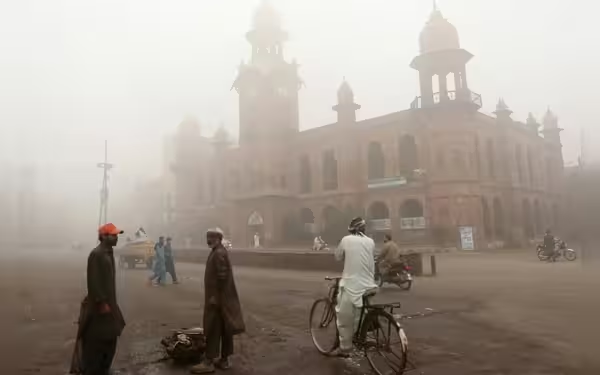Saturday, November 23, 2024 02:48 PM
Smog Crisis in Pakistan: Economic Impact and Urgent Solutions
- Air pollution costs Pakistan 6% of GDP annually.
- Punjab government initiates Green Transport Project.
- Public awareness is crucial for combating smog.
 Image Credits: tribune.com.pk
Image Credits: tribune.com.pkPakistan faces a severe smog crisis costing 6% of GDP, prompting urgent government action and public awareness for a cleaner future.
In recent years, Pakistan has been grappling with a severe smog crisis, particularly during the winter months. This thick blanket of pollution not only obscures visibility but also poses serious health risks to millions of citizens. The situation has reached alarming levels, prompting discussions about the economic implications of air pollution. According to the World Bank, air pollution costs Pakistan approximately 6% of its gross domestic product (GDP), translating to over $22 billion each year. This staggering figure highlights the urgent need for effective measures to combat this environmental challenge.
The economic toll of smog is multifaceted. It affects public health, leading to increased healthcare costs and reduced productivity as people fall ill. Schools often close, and outdoor activities are curtailed, impacting the education and well-being of children. Moreover, businesses suffer as employees take sick leave, and tourism declines due to poor air quality. The cumulative effect of these factors creates a significant burden on the economy, making it imperative for the government to take decisive action.
In response to this crisis, the Punjab government has initiated several measures aimed at reducing air pollution. One of the most notable initiatives is the Green Transport Project, which seeks to introduce 1,000 electric buses in major cities. This project not only aims to provide a cleaner mode of transportation but also to encourage the public to shift away from high-emission vehicles. Additionally, the government is implementing stricter penalties for those who continue to operate vehicles that contribute significantly to air pollution.
Despite these efforts, the question remains: why does action against smog remain elusive? One reason could be the lack of public awareness regarding the severity of the issue. Many citizens may not fully understand how air pollution affects their health and the economy. Furthermore, there is often resistance to change, especially when it comes to altering transportation habits or investing in cleaner technologies.
To truly tackle the smog crisis, a collective effort is required. This includes not only government initiatives but also public participation and awareness campaigns. Citizens must be educated about the importance of reducing emissions and the benefits of using public transport or electric vehicles. Only through a united front can Pakistan hope to mitigate the economic and health impacts of air pollution.
While the Punjab government is taking steps to address the smog crisis, the road ahead is fraught with challenges. The economic toll of air pollution is significant, and without a concerted effort from both the government and the public, the situation may continue to deteriorate. It is crucial for all stakeholders to recognize the importance of clean air, not just for health but for the economic prosperity of the nation. The time for action is now, and every small step counts towards a cleaner, healthier future for Pakistan.













